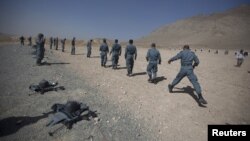Since the signing of the Strategic Partnership Agreement a year ago, the U.S. and Afghanistan have made progress on implementing the security, political, and economic transitions underway in Afghanistan.
The Strategic Partnership Agreement, said President Barack Obama, "defines a new kind of relationship between our countries – a future in which Afghans are responsible for the security of their nation, and we build an equal partnership between two sovereign states; a future in which war ends, and a new chapter begins."
In order to assess the progress to date, U.S. Deputy Secretary of State William Burns and Afghan Foreign Minister Dr. Zalmai Rassoul met recently at the second Afghanistan-U.S. Bilateral Commission.
Deputy Secretary Burns said both the U.S. and Afghanistan are on-track to fully transition security responsibility to Afghanistan by the end of 2014. Afghan forces are already in the lead in 90 percent of all combat operations in the country and should be in the lead 100 percent of the time later this year.
A successful security transition is linked to a successful political transition, so it is vital that presidential and provincial council elections scheduled for April 2014 be transparent, credible, and inclusive. That's why the United States is supporting Afghanistan’s electoral process without supporting a particular candidate. For their part, Afghan officials have committed to speed up election security planning and improve access to polls for all eligible voters, including women.
Afghan-led reconciliation is also central to the transition as a means to end violence and ensure lasting stability in Afghanistan and the region. For this reason, the U.S. affirms its support for negotiations between the High Peace Council and authorized members of the Taliban.
As Afghanistan moves ahead it also faces an economic transition towards self-sufficiency and private sector-led development. Moreover, regional economic development and integration are crucial to ensure that Afghanistan becomes a stable, secure, and prosperous part of Asia.
President Obama promised the Afghan people a year ago that as they stand up, they will not stand alone. Deputy Secretary Burns echoed that pledge as he addressed the Bilateral Commission. "America and many others will stand with you," he said. "We have come too far, sacrificed too much, and worked too hard to turn back now."
The Strategic Partnership Agreement, said President Barack Obama, "defines a new kind of relationship between our countries – a future in which Afghans are responsible for the security of their nation, and we build an equal partnership between two sovereign states; a future in which war ends, and a new chapter begins."
In order to assess the progress to date, U.S. Deputy Secretary of State William Burns and Afghan Foreign Minister Dr. Zalmai Rassoul met recently at the second Afghanistan-U.S. Bilateral Commission.
Deputy Secretary Burns said both the U.S. and Afghanistan are on-track to fully transition security responsibility to Afghanistan by the end of 2014. Afghan forces are already in the lead in 90 percent of all combat operations in the country and should be in the lead 100 percent of the time later this year.
A successful security transition is linked to a successful political transition, so it is vital that presidential and provincial council elections scheduled for April 2014 be transparent, credible, and inclusive. That's why the United States is supporting Afghanistan’s electoral process without supporting a particular candidate. For their part, Afghan officials have committed to speed up election security planning and improve access to polls for all eligible voters, including women.
Afghan-led reconciliation is also central to the transition as a means to end violence and ensure lasting stability in Afghanistan and the region. For this reason, the U.S. affirms its support for negotiations between the High Peace Council and authorized members of the Taliban.
As Afghanistan moves ahead it also faces an economic transition towards self-sufficiency and private sector-led development. Moreover, regional economic development and integration are crucial to ensure that Afghanistan becomes a stable, secure, and prosperous part of Asia.
President Obama promised the Afghan people a year ago that as they stand up, they will not stand alone. Deputy Secretary Burns echoed that pledge as he addressed the Bilateral Commission. "America and many others will stand with you," he said. "We have come too far, sacrificed too much, and worked too hard to turn back now."

















